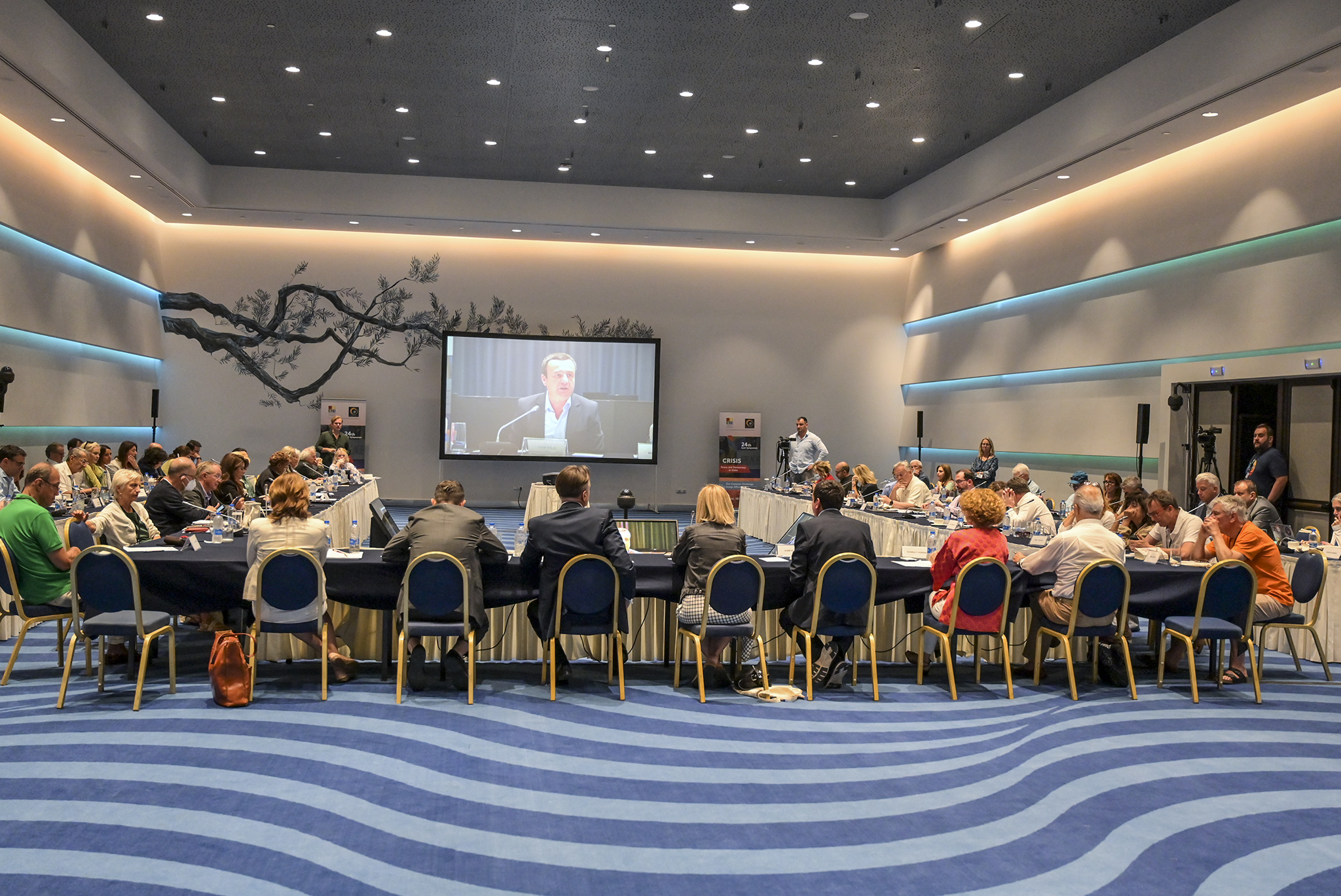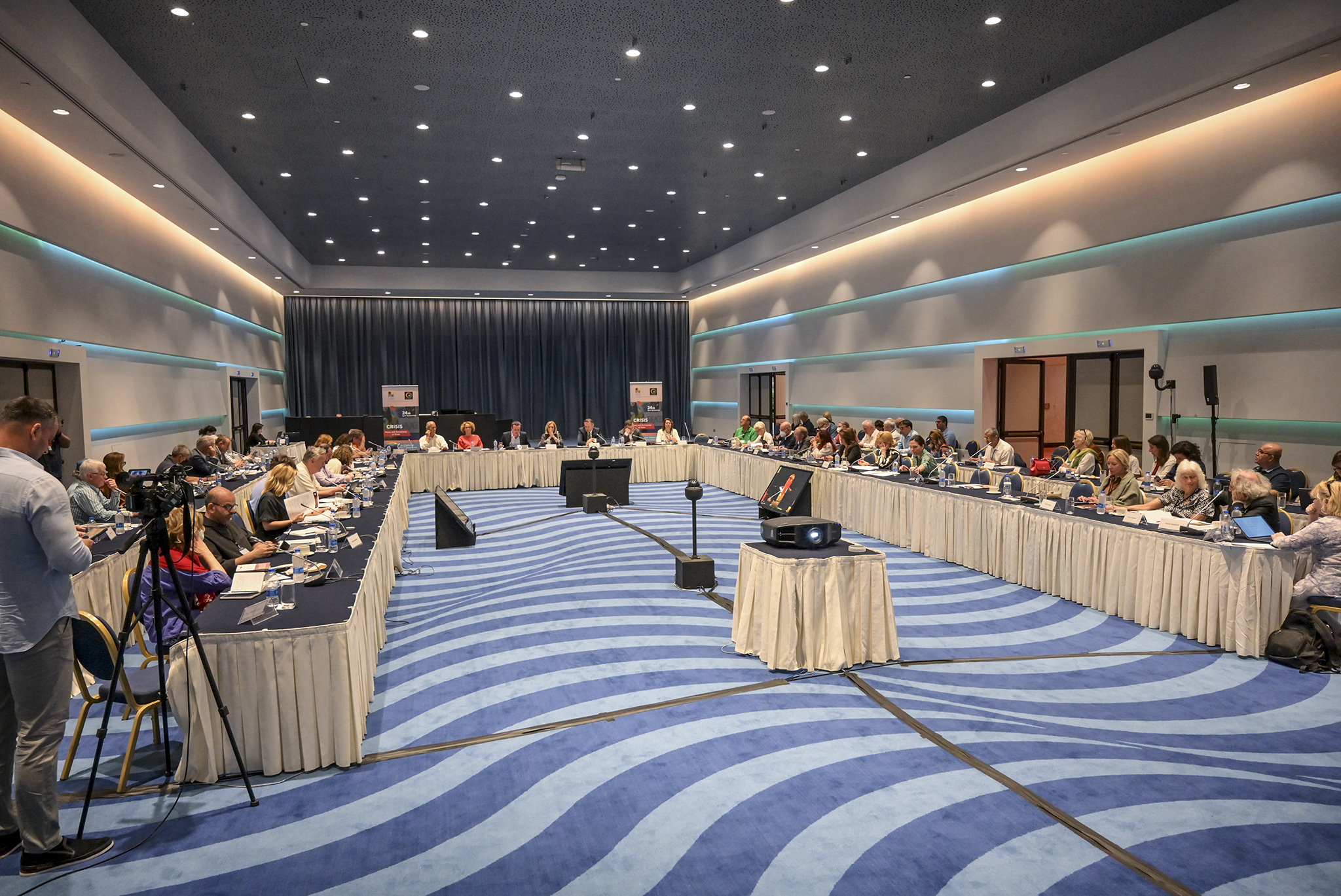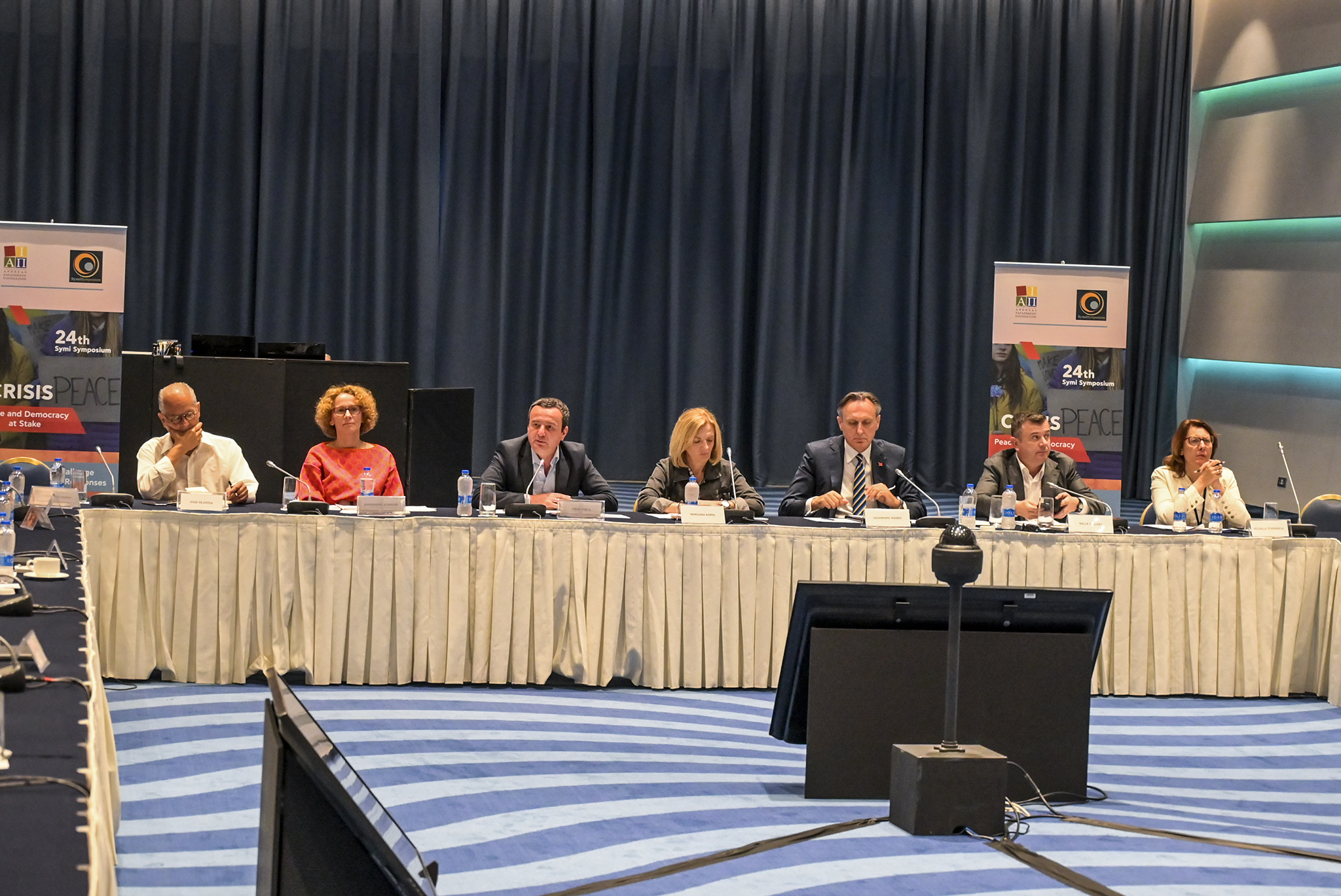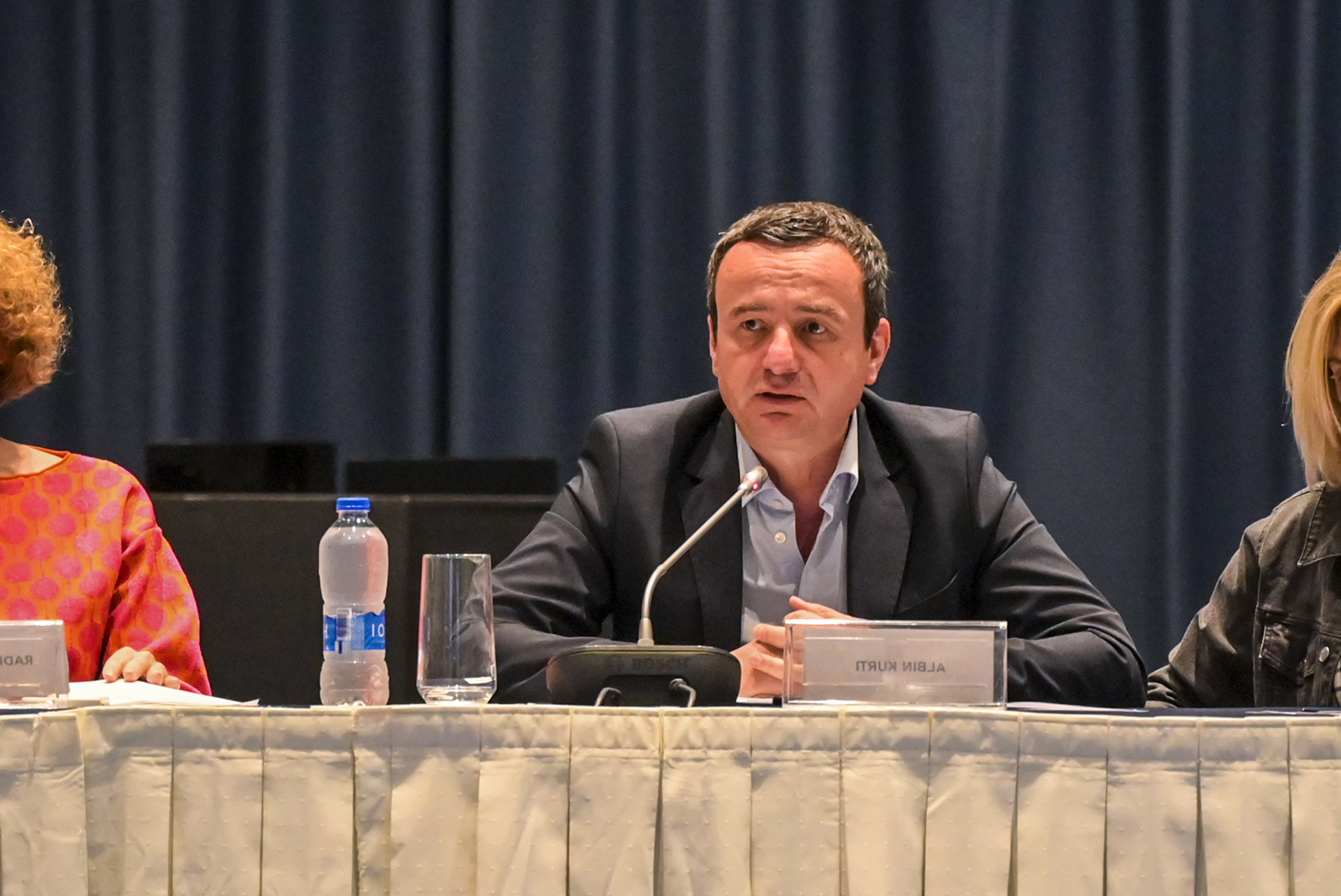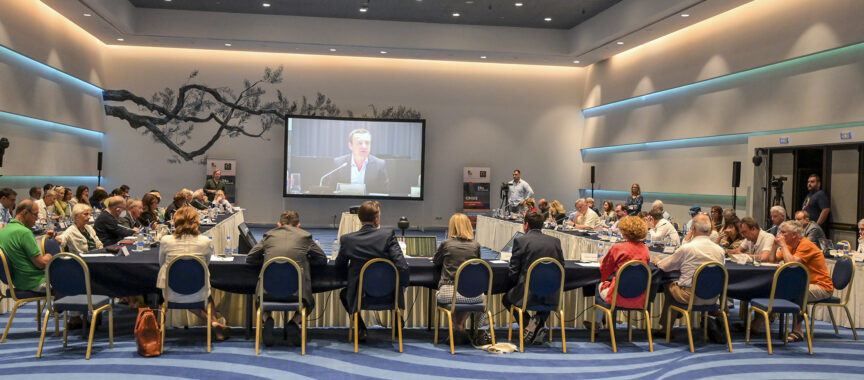Athens, July 11, 2022
The Prime Minister of the Republic of Kosovo, Albin Kurti, is participating in the Symposium Symposium, the 24th in a row in Athens.
On the first day of the symposium, Prime Minister Kurti discussed in the panel “Implications of the war in Ukraine: The new strategy for pushing forward the entry into the EU of the Western Balkans? ”Possibilities and scenarios”.
In his discussion, Prime Minister emphasized the achievements in the first year of governance, the improvement of economic and democratic indicators, as a result of institutional stability.
He said that Kosovo is a double success story. On one side is the success story of NATO’s intervention in 1999, to stop the Serbian genocide of the Milosevic regime, while on the other side, as the prime minister said, is the success story of combining economic growth with qualitative democracy.
As for the integration in the European Union, the Prime Minister expressed his belief that the best way forward is with the Berlin Process, after the new beginning started by Chancellor Scholz. This Berlin Process 2.0, as Prime Minister Kurti called it, would bring the common regional market and the EU as a value and mechanism within the six countries of the Western Balkans.
“When I say European values, I mean the rule of law, human rights, civil rights, dealing with the past, democratization, media freedom, minority rights,” he said.
On the Russian invasion and military aggression in Ukraine, the Prime Minister said that it is an urgent task for the EU, and that he believes that in addition to showing empathy, sympathy and solidarity to the people of Ukraine and their efforts for liberation, we must do everything we can to help them free themselves.
Prime Minister Albin Kurti said today that the EU and NATO should cooperate more because the security and defense of Europe of this century will be decided in this decade.
Prime Minister Kurti’s full speech:
Good afternoon!
It is a great honor and pleasure to be in Symi, to come back here, and I think there are no people who don’t come back here. It is the great forum of progressive politics, of social democrats and greens.
We had a pretty good first year in government after last year’s plebiscite victory, in February last year. We had institutional stability that enabled us to have an impressive economic growth of 10.3 percent of the gross domestic product, the first ever double-digit growth after liberation in 1999.
Foreign direct investments have increased by 22 percent, tax revenues by 54 percent, without changing the fiscal policy. I think that when they have hope, people spend more than they save, and when they see that there is no corruption in the government, they are more willing to pay taxes.
In addition, we had a 10.3 percent increase in capital investment, we added 25,000 new jobs to the labor market, and we had an 83.6 percent increase in exports despite a low base, exports increased 83.6 percent, processing of timber, leather, textile, food, beverage and ICT sector.
We have risen to 17 places in anti-corruption, in the anti-corruption perception index, and we have also risen to 17 places in the index of media freedom, in the World Freedom index.
According to the World Justice Project, for the evaluation of the rule of law, Kosovo is the 60th in the world table and the first among the six countries of the Western Balkans. We have welcomed around 1,500 Afghan refugees, 5 percent of whom are still in Kosovo, and we have expressed our readiness to accept up to 5,000 Ukrainian refugees.
Today four journalists from Ukraine became citizens, residents of our Pristina capital city, in addition to four journalists who are already working from Pristina informing the people of Ukraine and beyond.
This was a year of economic growth and anti-corruption, of the social democratic government with institutional stability. We had the Economic Revival Package, 7 percent of the gross domestic product for those who lost their jobs, for profiling in jobs, for local production, increased exports, support for families, support for healthcare workers and the police during the COVID-19 pandemic and many, many more.
We have made public education free of charge even at the university level, and we have especially increased the number of scholarships for girl students in STEM and for minorities. Because girl students are generally better than boy students, but after they graduate they end up in the public sector, where salaries are quite low, while boys go to the private sector, where salaries are higher, especially in the IT sector. In the medium term we see this as a social gap that we want to prevent. This is why when it comes to STEM studies we are giving girls a huge priority.
We have increased the budget for the subsidy per hectare for wheat and we are supporting agriculture like no other government before us. We are putting an end to informality and monopolies in the economy, we have seized 1.1 tons of narcotics, destroyed 54 criminal groups, 270 state and public officials have been arrested for corruption and abuse of office in the first year of our four-year mandate.
We believe that Kosovo is a double success story. On one side is the success story of NATO’s intervention in 1999, to stop the Serbian genocide of the Milosevic regime. The intervention in Kosovo was worth it.
And we are also the success story of combining economic growth with qualitative democracy. Because as we know there are some superpowers who want to prove that economic development does not need democracy, in fact that autocracy is better because it brings secure stability.
But we are proving that economy and democracy can go hand in hand and this is very important because it is a very big effort about the discourse, about the narrative in the 21st century. We are not a very big country, but we are a very good example of economic development and qualitative democracy that goes together.
Autocracies are dangerous everywhere, not just the Russian Federation, and I believe that favoring political stability before democratic reforms has brought these autocrats to the scene.
For a long time we favored political stability before democratic reforms. It has been 227 years since Immanuel Kant delivered his famous essay “on Perpetual Peace – Democracies do not fight each other”.
And we can see this in the case of the Russian invasion and military aggression in Ukraine. If the Russian Federation were democratic, it would not attack Ukraine. There is also a contrast here; it is not only autocracy against democracy, but also the Republic against the Empire, because I think we live in difficult times when the Republic is being fought. People who do not believe in civil rights, human rights, who do not believe in equality, but in power, only in power, which they use, misuse, exercise, and then we have these consequences.
Regarding the integration in the European Union, I believe that we have the best way forward with the Berlin Process, if I can call it 2.0, after the new beginning started by Chancellor Scholz that we are all waiting for in the fall of this year. This Berlin Process 2.0 would bring the common regional market and the EU as a value and mechanism within the six countries of the Western Balkans.
When I say European values, I mean rule of law, human rights, civil rights, dealing with the past, democratization, media freedom and minority rights.
I think that with Chancellor Scholz in Berlin and President Biden as the leading progressive world leader currently in the White House, we can strengthen the transatlantic beyond the security aspect, also in terms of social democratic and progressive views of the world. Time is showing that somehow the EU has been left to the left-wing. Because right-wing factors and governments want a weakened EU for their national benefits.
It is the social democrats, the leftists, to whom the EU has been left as the main historical process and political project of peace and prosperity in Europe since the Second World War. The left must have the courage to embrace their fate of being left with the EU. And this is the crucial issue for the social democrats today.
The Berlin 2.0 process could be modeled after the EFTA-EEA, similar to Norway, Liechtenstein, Switzerland and Iceland that have it as a contract with the EU, with common courts, advisory and supervisory authorities, where the EU would develop internally in each state, but still not by itself, because we need help from outside. So we have to develop the EU within ourselves. I think that for all of us Europe is our continent and the EU is our destiny and I think we are lucky for that.
I am very often critical of the EU, but never cynical or bitter. It is a mistake to be cynical or bitter because in some cases the EU’s lack of trust in the people and states of the Western Balkans has nothing to do with us, but with the EU. It is an expression of lack of self-confidence. So, when the EU shows distrust towards us, I worry about the EU, not about us, and I really want to contribute to a better EU, to the enlargement of the EU, where internal consolidation and external enlargement go alongside each other.
Of course, the Russian invasion and military aggression is an urgent task for the EU, and I believe that in addition to showing empathy, sympathy and solidarity to the people of Ukraine and their liberation efforts, we must do everything we can to help them free themselves.
And I feel that always the conquered peoples can pay a high price for the conquest and in the end win their freedom. And it is possible.
We should not think about the probability that we will win, but simply help because we are on the right side. So, it is time for the normative based on the view of values, not the calculation for the utilitarian approach.
We have not seen this brutal and unjustified invasion before and I think it probably won’t be seen in the near future either. I am particularly worried about this because in the Western Balkans, Serbia has developed very broad and close relations with the Russian Federation. But I can talk more about that in the Q&A.
I just want to emphasize the fact that last year Serbia planned 99 joint military activities with Russia and carried out 104, so they exceeded their plan. In 2012 only 2 joint military activities, 50 in 2016, last year 104. Gazprom also owns 56 percent of the shares of the oil industry of Serbia, most of the shares of the largest gas depot in Banjski Dvor in Vojvodina, which is the second largest in Southeast Europe. Out of 250 members of the Serbian parliament, 151 were members of the Serbia-Russia friendship group.
Sputnik’s regional headquarters for the Balkans is in Belgrade. The connection of the Republika Srpska in Bosnia, and especially of Serbia’s connection with the Kremlin, should worry us all. There are 48 forward operating bases around the border with Kosovo since August 2001; 28 are military, 20 are gendarmerie.
I’m not saying that they will attack us this month or next month, I don’t think it’s likely to happen, but what worries me is that if after Ukraine there will be a conflict, i.e. a “spill over” somewhere else, then the Balkans will be episode number three. I don’t think we are episode number two, as far as we know we had episode number one in Ukraine, my hunch tells me that we will probably be episode number three.
Therefore, the EU and NATO must cooperate as they need each other more than ever.
We participated in “Defender Europe 2021” last year, we will participate in “Defender Europe 2023” next year.
We need more joint activities because the security and defense of Europe of this century will be decided in this decade.
Thank you very much.
Last modified: July 14, 2022
